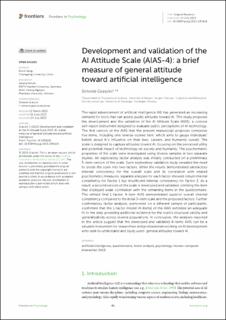| dc.contributor.author | Grassini, Simone | |
| dc.date.accessioned | 2023-10-18T09:07:23Z | |
| dc.date.available | 2023-10-18T09:07:23Z | |
| dc.date.created | 2023-09-13T14:00:05Z | |
| dc.date.issued | 2023-07 | |
| dc.identifier.citation | Grassini, S. (2023) Development and validation of the AI attitude scale (AIAS-4): a brief measure of general attitude toward artificial intelligence. Frontiers in Psychology, 14 | en_US |
| dc.identifier.issn | 1664-1078 | |
| dc.identifier.uri | https://hdl.handle.net/11250/3097215 | |
| dc.description.abstract | The rapid advancement of artificial intelligence (AI) has generated an increasing demand for tools that can assess public attitudes toward AI. This study proposes the development and the validation of the AI Attitude Scale (AIAS), a concise self-report instrument designed to evaluate public perceptions of AI technology. The first version of the AIAS that the present manuscript proposes comprises five items, including one reverse-scored item, which aims to gauge individuals’ beliefs about AI’s influence on their lives, careers, and humanity overall. The scale is designed to capture attitudes toward AI, focusing on the perceived utility and potential impact of technology on society and humanity. The psychometric properties of the scale were investigated using diverse samples in two separate studies. An exploratory factor analysis was initially conducted on a preliminary 5-item version of the scale. Such exploratory validation study revealed the need to divide the scale into two factors. While the results demonstrated satisfactory internal consistency for the overall scale and its correlation with related psychometric measures, separate analyses for each factor showed robust internal consistency for Factor 1 but insufficient internal consistency for Factor 2. As a result, a second version of the scale is developed and validated, omitting the item that displayed weak correlation with the remaining items in the questionnaire. The refined final 1-factor, 4-item AIAS demonstrated superior overall internal consistency compared to the initial 5-item scale and the proposed factors. Further confirmatory factor analyses, performed on a different sample of participants, confirmed that the 1-factor model (4-items) of the AIAS exhibited an adequate fit to the data, providing additional evidence for the scale’s structural validity and generalizability across diverse populations. In conclusion, the analyses reported in this article suggest that the developed and validated 4-items AIAS can be a valuable instrument for researchers and professionals working on AI development who seek to understand and study users’ general attitudes toward AI | en_US |
| dc.language.iso | eng | en_US |
| dc.publisher | Frontiers Media S.A | en_US |
| dc.rights | Navngivelse 4.0 Internasjonal | * |
| dc.rights.uri | http://creativecommons.org/licenses/by/4.0/deed.no | * |
| dc.subject | AI | en_US |
| dc.subject | KI | en_US |
| dc.subject | kunstig intelligens | en_US |
| dc.title | Development and validation of the AI attitude scale (AIAS-4): a brief measure of general attitude toward artificial intelligence | en_US |
| dc.type | Peer reviewed | en_US |
| dc.type | Journal article | en_US |
| dc.description.version | publishedVersion | en_US |
| dc.rights.holder | © 2023 The Authors. | en_US |
| dc.subject.nsi | VDP::Samfunnsvitenskap: 200::Psykologi: 260 | en_US |
| dc.source.volume | 14 | en_US |
| dc.source.journal | Frontiers in Psychology | en_US |
| dc.identifier.doi | 10.3389/fpsyg.2023.1191628 | |
| dc.identifier.cristin | 2174751 | |
| dc.source.articlenumber | 1191628 | en_US |
| cristin.ispublished | true | |
| cristin.fulltext | original | |
| cristin.qualitycode | 1 | |

